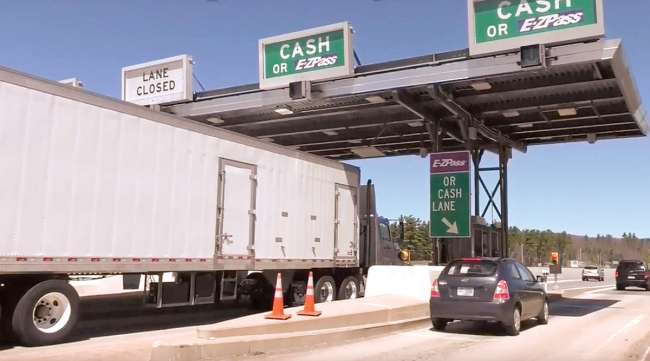Staff Reporter
Court Denies RIDOT’s Motion for Judgment in Truck Tolling Case

[Stay on top of transportation news: Get TTNews in your inbox.]
The U.S. District Court of Rhode Island has denied the Rhode Island Department of Transportation’s motion for judgment on pleadings related to the state’s hotly contested trucks-only tolling system, marking a victory for the trucking industry.
The decision, issued July 20, is the latest development in an ongoing lawsuit between RIDOT and trucking industry representatives, including American Trucking Associations, Cumberland Farms Inc. and M&M Transport Services Inc. New England Motor Freight also was part of the lawsuit but has since filed for Chapter 11 bankruptcy and shut down operations.
The trucks-only tolling system is part of Gov. Gina Raimondo’s RhodeWorks program, which is projected to generate $4.7 billion to finance infrastructure projects.
ATA v. Alviti by Transport Topics on Scribd
The defendants, RIDOT Director Peter Alviti and the Rhode Island Turnpike and Bridge Authority, filed their motion for judgment after the plaintiffs filed a motion for preliminary injunction in March, according to the court document. The court heard both motions May 28.

Alviti
“During and following that hearing, the court discussed with the parties the need for further briefing on several issues,” the court decision document states.
One of those issues related to the plaintiffs’ argument that truck tolls discriminate against interstate commerce. If a state charges a user fee for access to channels of interstate commerce, that fee has to be a fair approximation of use and cannot discriminate between in-state and out-of-state interests. Many truckers rely on Interstate 95, which passes through Rhode Island and contains some of the tolling gantries, for hauls throughout the Northeast.
ATA Deputy General Counsel Rich Pianka explained RIDOT was relying on a provision that allows bridges that are being reconstructed to be converted into toll facilities. He said RIDOT argued that authority essentially “immunized” bridge tolls from commerce clause-related scrutiny.
“When it comes to tolls, states have to ensure that tolls do not discriminate against interstate commerce [and] do not favor in-state commercial interests over out-of-state commercial interests,” Pianka told Transport Topics. “The district court didn’t see any immunizations of Rhode Island’s tolls. They still need to be nondiscriminatory. They still need to be a fair approximation of use.”
Kristy dosReis, spokeswoman for the Rhode Island Office of the Attorney General, said the office respects the court’s decision.
“We continue to prepare for trial on the remaining aspects of the case,” dosReis said.

Pianka
Another issue the court weighed in on pertained to the use of statements Rhode Island officials had made regarding the toll program. The plaintiffs had expressed intent to introduce at trial statements from officials that support the argument that RhodeWorks was enacted with discriminatory purpose. RIDOT challenged the statements on the basis of relevance. The court decided that the statements could be relevant and are therefore admissible. However, the document also notes that, during trial, the court will need to decide how much weight to afford the statements in relation to the text of the statute.
“It was as clear as a bell that they were designing this program to be discriminatory so they could sell it to Rhode Island voters,” Pianka said. “It means that the evidence that we think is crystal clear on what’s going on here is going to be admissible, and we get to move forward to trial and prove our case.”
Want more news? Listen to today's daily briefing:
Subscribe: Apple Podcasts | Spotify | Amazon Alexa | Google Assistant | More




